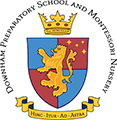The qualities we aim to develop are tidiness, concentration, self-discipline, independence, obedience, self-confidence and to be outgoing and sociable. The equipment is divided into different areas of the curriculum. The emphasis is on learning through doing. The children are taught to select a task, take it to a table or mat, and return it to the shelf when they have finished. Much of the equipment is Montessori but we do have equipment from other sources, which complement the educational programme the school follows.
The Montessori Method is not solely appropriate for the age group for which it is best known; that is for children from birth to six years of age. The philosophy and the Montessori teaching apparatus can be used with children up to the age of twelve years and well beyond.The mathematical apparatus in particular is extremely useful to help children to understand the concept behind a mathematical principle.
The Principles of the Montessori Method
The Montessori approach aims to allow children to grow naturally, to retain their individuality, and to develop their own unique personality. Maria Montessori’s educational principles are based around the three central ideas outlined below:
Universal Characteristics of Childhood
All children want to learn. Within the freedom to investigate the world around them, they will become active learners.
From birth to six years of age, children have an absorbent mind. Everything that occurs in their life has a profound effect, and therefore, the quality of early experiences is of fundamental importance to their self-construction.
Children pass through sensitive periods in their development.
Special Qualities of the Teacher
The teacher has had a professional preparation and has undergone a process of self-evaluation.
- She/he has a well-developed attitude and respect for the children in her/his care.
- She/he is responsible for selecting and making available the appropriate developmental activities.
- She/he guides the children’s learning, helping them develop independence, concentration, self-motivation and self-discipline.
We must stress that ours is not a purist Montessori school. We believe in Montessori theories on child development and use Montessori equipment and apparatus, particularly in the early years. However, we also have equipment from all the major educational suppliers that we believe will enhance the children’s learning.
